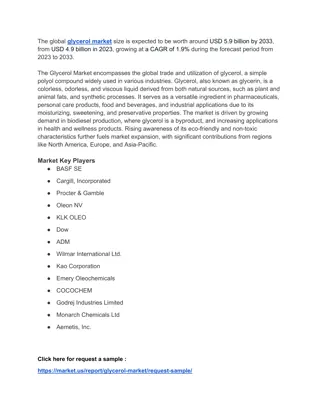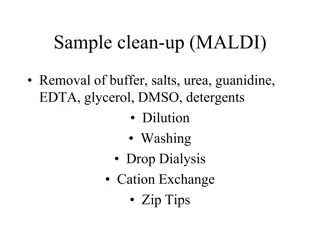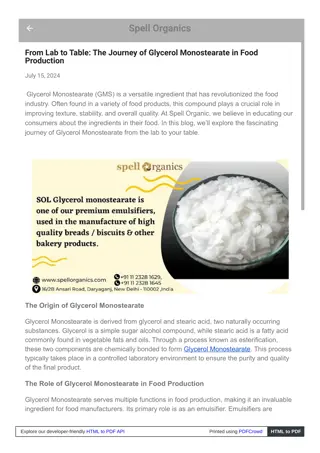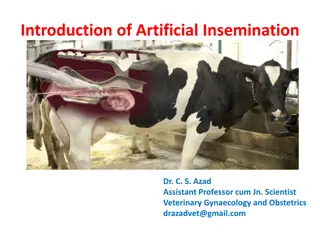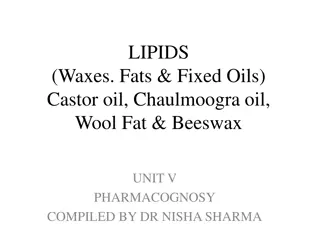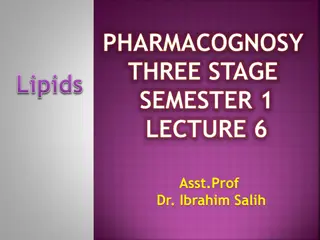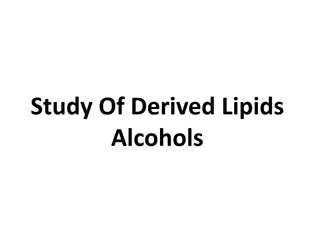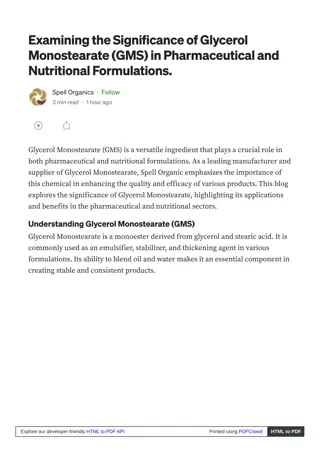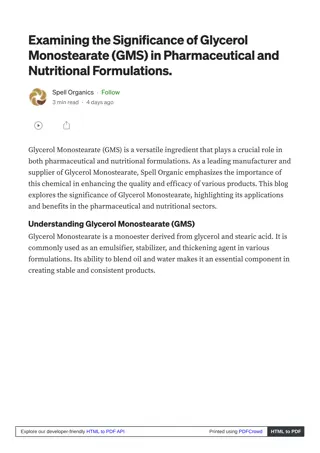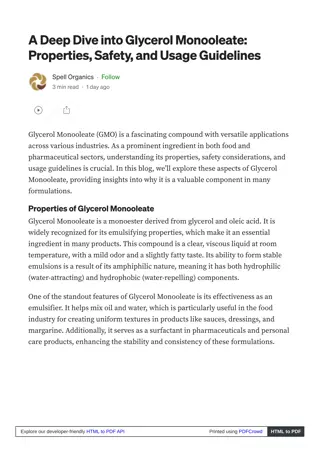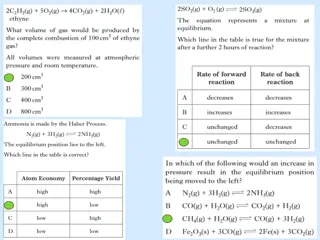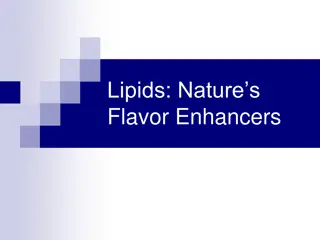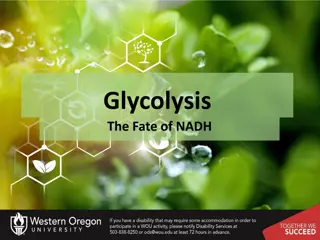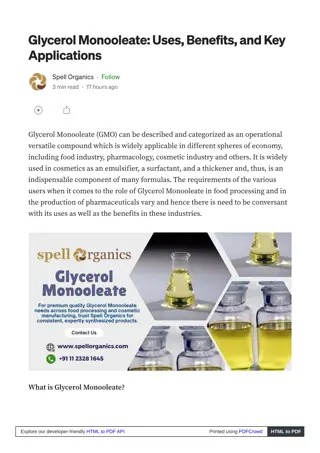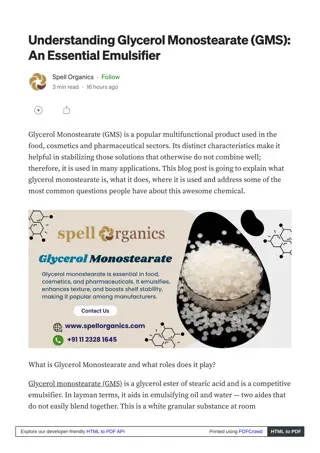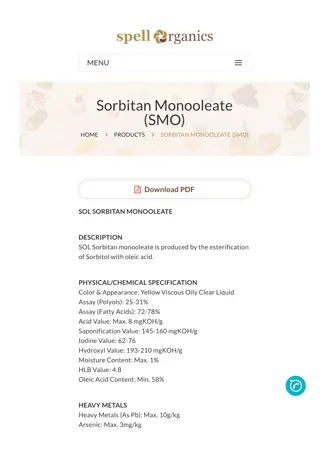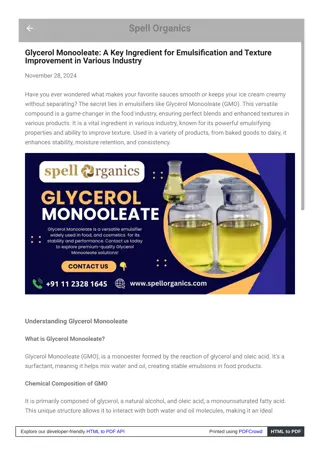Glycerol Market
The global glycerol market size is expected to be worth around USD 5.9 billion by 2033, from USD 4.9 billion in 2023, growing at a CAGR of 1.9% during the forecast period from 2023 to 2033.\n
2 views • 5 slides
Protein Sample Clean-Up Methods for MALDI Analysis
Protein sample clean-up for MALDI involves removing various contaminants like buffer, salts, urea, guanidine, EDTA, glycerol, DMSO, and detergents through methods such as dilution, washing, drop dialysis, cation exchange, and solid phase extraction using Zip tips. The process aims to reduce interfer
0 views • 8 slides
Enhancing Texture and Extending Shelf Life in Baking with Glycerol Monostearate
Glycerol Monostearate (GMS) is a versatile ingredient in baking, known for enhancing texture and extending shelf life. By acting as an emulsifier, Glycerol Monostearate (GMS) helps to improve the consistency and stability of dough and batter, resulti
0 views • 3 slides
Overview of Artificial Insemination in Veterinary Practice
Artificial Insemination, a technique involving the deposition of semen into the female reproductive tract using artificial means, has a rich history of development dating back to ancient times. Starting from the Arab Horse Breeders in 1322 A.D. to modern advancements like cryopreservation and long-d
0 views • 8 slides
Understanding Lipids: Waxes, Fats, and Fixed Oils
Lipids are organic compounds like waxes, fats, and fixed oils found in plants and animals. Fixed oils are reserve food materials, while fats are solid at higher temperatures. These substances are esters of glycerol and fatty acids, with various components giving them unique properties and flavors. C
0 views • 20 slides
Introduction to Lipid Biosynthesis and Fixed Oils in Pharmacognosy Lecture
In this lecture by Asst. Prof. Dr. Ibrahim Salih, the focus is on lipid biosynthesis, specifically the three phases involved: glycerol formation, fatty acid biosynthesis, and triglyceride production. The classification of fixed oils into drying, semi-drying, and non-drying categories based on their
0 views • 13 slides
Exploring Alcohols in Lipid Structures and Their Importance
Delve into the world of derived lipids alcohols, such as glycerol, sphingosine, and cholesterol, which play vital roles in various forms of lipids. Learn about the classification of alcohols involved in lipid structures and their significance as derived lipids. Discover how glycerol, a polyol, acts
0 views • 67 slides
Exploring the Benefits of Glycerol Monostearate in Food Formulations
Glycerol Monostearate offers numerous advantages in food formulations, enhancing both texture and stability. As an effective emulsifier, glycerol monostearate helps blend oil and water phases seamlessly, improving the consistency of food products. It
0 views • 11 slides
Understanding Sorbitan Monooleate: Applications and Benefits in Industry
Sorbitan Monooleate is a versatile emulsifier widely used across various industries, including cosmetics, food, and pharmaceuticals. Its ability to stabilize emulsions makes it essential in creating consistent and high-quality products. In the food i
0 views • 11 slides
Understanding the Science of Glycerol Monooleate and Its Functional Properties.
Understanding the Science of Glycerol Monooleate and Its Functional Properties\" explores the diverse applications and benefits of this versatile chemical compound. Glycerol Monooleate is widely used as an emulsifier, stabilizer, and surfactant in va
0 views • 10 slides
Understanding Fats and Oils: Properties and Formation
Learn about the properties of fats and oils, including their formation through a condensation reaction of glycerol with fatty acids. Explore the role of fats in the diet, different types of natural fats and oils, and the chemical composition of triglycerides. Discover the significance of fatty acids
0 views • 17 slides
Understanding Lipids: Nature's Flavor Enhancers
Lipids, a category of organic compounds, are essential for enhancing flavors in food. They contain carbon, hydrogen, and oxygen but do not dissolve in water. Lipids come in three general types - triglycerides, phospholipids, and sterols. They consist of glycerol and fatty acids, with variations like
0 views • 38 slides
Understanding NADH Fate in Cellular Metabolism
Explore the intricate pathways involved in the fate of NADH in cellular metabolism, including aerobic and anaerobic processes such as the Malate Aspartate Shuttle, Glycerol-3Phosphate DHAP Shuttle, and the Cori Cycle. Learn how NADH is recycled and its significance in energy production.
0 views • 9 slides
Comprehensive Overview of Glycerol Monooleate: Uses, Benefits, and Applications
This document provides an in-depth exploration of Glycerol Monooleate, a versatile compound widely utilized across various industries. It highlights its role as an emulsifier, surfactant, and stabilizer in the food, pharmaceutical, and cosmetic secto
0 views • 10 slides
Glycerol Monostearate: Versatile Ingredient for Multiple Industries
Glycerol Monostearate (GMS) is a multifunctional emulsifier used in food, cosmetics, and pharmaceuticals. It enhances texture, improves stability, and ensures product consistency. Widely recognized for its safety,Glycerol Monostearate (GMS) is also a
0 views • 10 slides
Sorbitan Monooleate- Perfecting Food Emulsions and Cosmetic Creams
Sorbitan Monooleate (SMO) is a versatile emulsifier that plays a critical role in perfecting food emulsions and cosmetic creams. It ensures smooth textures and stable formulations by preventing ingredient separation and enhancing consistency. Whether
0 views • 5 slides
Glycerol Monooleate Enhancing Product Quality in Food and Cosmetic Industries
Glycerol Monooleate is a multifunctional ingredient known for its ability to improve product quality in food and cosmetic industries. Glycerol Monooleate ensures consistency and longevity, making it a reliable choice for manufacturers. Spell Organics
1 views • 5 slides
